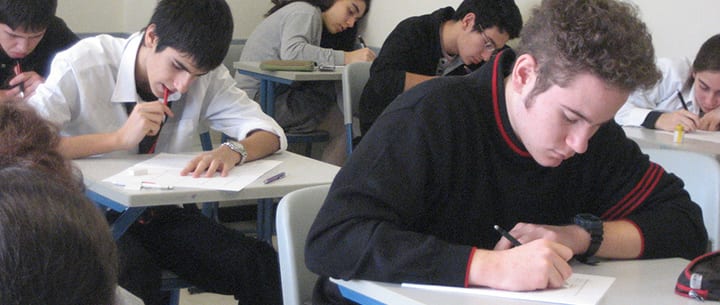 Remember learning about writing your thesis statement? It can be difficult to get just right, even for the best writers! Here, online tutor Lourdes C. cuts through the confusion with her simple guide to how to write a good thesis:
Remember learning about writing your thesis statement? It can be difficult to get just right, even for the best writers! Here, online tutor Lourdes C. cuts through the confusion with her simple guide to how to write a good thesis:
A thesis – your worst nightmare, and the second highest cause of college breakdowns, next to heartbreak. You get this every class. You think you know how to think, you think you know how to write, then your instructor gives you a handout that requires a “research-driven thesis” as an assignment. You think you know how to write a good thesis because you vaguely remember in 9th grade that you are supposed to give a strong argument and back it up with evidence… kind of like CSI… But you turn in your paper and get a C, or worse, and have to decipher red comments in the margins of what you thought was a masterpiece because you have no clue what “thesis” actually means. Maybe you’ll find a tutor, ask your roommate for help, or look it up online – only to find contradictory examples and explanations. Here are dictionary definitions of the word:
-
A statement or theory that is put forward as a premise to be maintained or proved (example: his central thesis is that psychological life is not part of the material world)
-
(In Hegelian philosophy) A proposition forming the first stage in the process of dialectical reasoning
-
Late Latin from Middle Greek, “placing a position, from the root tithenai, ‘to place’
-
Related terms: synthesis, antithesis, apotheosis, theme, theory, theology and even theatre
Regardless of definitions, when you realize finally what a proper thesis is, you will indeed feel like someone handed you the golden keys to academic success. Those are expensive keys. No one will willingly hand them to you for free, except for tutors like myself who are tired of spending hours a week watching panic attacks and nervous breakdowns over a simple little thing like writing a strong thesis.
So cut to the chase, I always say. What a strong thesis is, a bad thesis isn’t. That is to say, let’s start with what a thesis is not, and dispel all those 9th-grade-English-teacher myths that baffled your mind all these fruitless C- and B+ years. A thesis is none of the following: an argument, a counter-argument, a question, an opinion, a claim, a warrant, or a persuasion.
What? A thesis is not an argument?
The problem with theses is that they are explained poorly too often by people who also do not fully understand what a thesis is. That’s easy to correct. A thesis is, as above, something that allows for argument and counter-argument, something that answers a research question. So, to formulate a thesis, you first need to do the research. As you’re researching, certain questions have to be asked in order for a premise to be reached. Asking the right questions is the key to writing a proper thesis, not coming to right conclusions.
Questions to ask while conducting the research are related to phases of logical reasoning, the construction of an argument. So, the “right” questions to ask are not “who, what, where, why, how, and when” (9th grade book report questions) but rather, “What would have happened if the event in question didn’t happen/someone else took charge/the winning side lost instead/no one ever found out this occurred?” and “What difference does this make?” and “Who is or will be impacted by these facts and conclusions?” These questions relate to logos (reasoning), ethos (validity and implication), and pathos (appeal), respectively. The best way to inform is to show, so here’s an example:
Spielberg’s expert direction of “Saving Private Ryan” is the best example of accurately filming combat scenes in the film industry.
This is everything but a thesis, an answer to a research question that is arguable yet defendable. A thesis does not just state a position, it informs the reader ahead of time as to what they will be looking at and considering, and as to what they will argue or agree with based on your exploration. Examine this statement: “Steven Spielberg goes against the grain in film tradition to give audiences a first-person perspective of the gruesome reality of war.” This thesis answers the following question: “Why is Spielberg so different?”, “What makes him so good as a director?”, “Why is this film so much more effective than others of its kind?”, and also, “What will readers be examining in this paper?”
The rest of the paper then must include and focus on the following: Spielberg’s camera shots vs. traditional camera shots, impact and potential implications for audiences, other directors and the film industry, the success of the film, and possibly suggestions for new camera directions that would build on that found in the film. A thesis is formed after doing the research but it must begin with an idea, a “position” that spurs the research on and frames it clearly. “What would have happened if…?” and “What difference does this make?” and “Who is or will be impacted by these facts and conclusions?” are the guiding questions.
The answers are, for this example, Scorsese and Coppola would have handled it with third-person voyeuristic detachment and lofty sky shots, removing the audience instead of bringing them into the action. The film industry and viewing audiences have been indelibly impacted by Spielberg’s work. The revised thesis looks like: “Spielberg’s innovative first-person camera direction gives audiences a true sense of how traumatizing and dangerous combat actually is; although, his technique has substantially changed the way the film industry depicts violence.”
The quickest way to learning how to write a good thesis is to watch the movie, ask these questions, and arrive at your own answers. The antithesis of a thesis is an opinion disguised as an argument about an invalid source that invites no counter-argument.
 Lourdes C. joined TakeLessons in 2014. Her doctorate is in Applied Linguistics and American Indian Studies. She has been an instructor and tutor for over twenty years for academics, research methods, languages and literature, and music as well. Book local or online lessons with Lourdes here!
Lourdes C. joined TakeLessons in 2014. Her doctorate is in Applied Linguistics and American Indian Studies. She has been an instructor and tutor for over twenty years for academics, research methods, languages and literature, and music as well. Book local or online lessons with Lourdes here!
Photo by ccarlstead
Suzy S.

